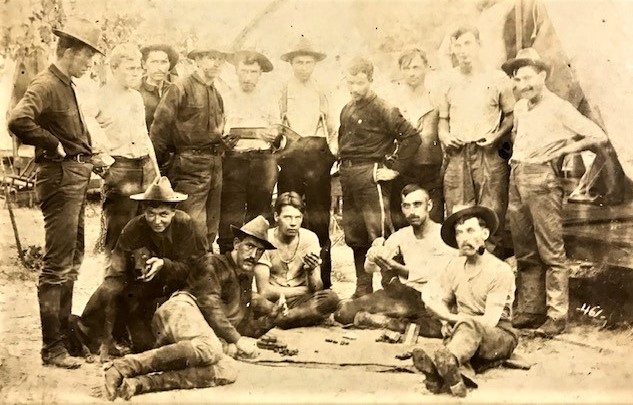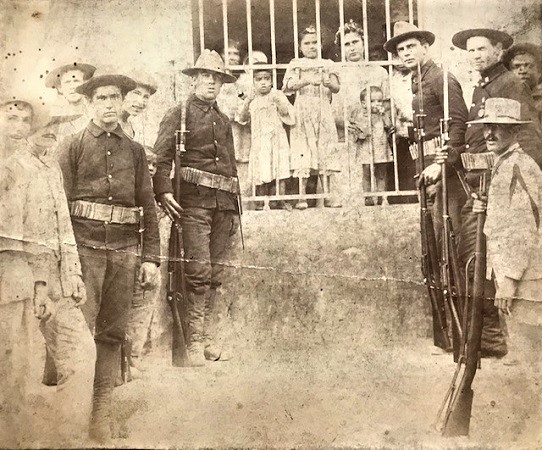


The Second Illinois Volunteer Infantry served in the occupation forces
in Cuba.
Unit History:
The 2nd Illinois
Volunteer Infantry was mustered into service at Camp Tanner, Springfield,
Illinois on May 15, 1898. At the time of mustering in, the regiment
consisted of 50 officers and 980 enlisted men under the command of Col.
George M. Moulton.
On May 23, the regiment departed Springfield for Camp Cuba Libre at Jacksonville, Florida, where it was assigned to the First Brigade, 2nd Division of Maj. Gen. Fitzhugh Lee's Seventh Army Corps. The regiment remained at Camp Cuba Libre throughout the summer of 1898.
Life at Camp Cuba Libre was not without its drama. In June, the members of the regiment were thrilled when the division quartermaster contracted with a local source for shoes and underwear as government sources were not providing these items quickly enough. Many of the men were without shoes and, presumably, underwear. In addition, the men had not been paid since being mustered in, and did not expect to be paid until July, creating many hardships for the men. Also, though in camp and not on the march, the men were relegated to shelter tents which were not considered to be healthy under the conditions. New, larger tents were eventually issued. In addition, two hundred men in companies F and K were sickened by eating spoiled pork at one point, but the illness was not life-threatening.
On July 15, Illinois Governor John R.Tanner and his entourage arrived at Camp Cuba Libre to review the 2nd and 4th Illinois regiments and to inspect the camp conditions. After having the regiments pass in review, the governor presented the 2nd Illinois with its new state flag. The new flag replaced he regiment's old flag which was worn and somewhat in tatters. The venerable old flag was presented to Col. Moulton's wife, who had been present in camp helping to care for the regiment's sick. Later the governor forwarded a large 16 foot by 30 foot tent to Mrs. Moulton that she utilized for convalescent soldiers.
By August the Florida heat was having an impact. On some days drill was cut short or cancelled. The time was spent in rifle training and target practice. While the regiment was still in this camp, an armistice was reached ending the war's fighting on August 12.
On October 24 the regiment departed Jacksonville for Savannah, Georgia where it arrived he following day. In Savannah, the 2nd Illinois Volunteer Infantry embarked on transports bound for Havana, Cuba. The regiment's first and second battalions embarked on the transport MICHIGAN on December 9, arriving in Cuba four days later, on December 13. While the MICHIGAN was at sea en route to Cuba, the Treaty of Paris was signed ending the war. The third battalion embarked on the transport MOBILE on December 13, arriving in Havana on December 15. The reunited regiment was encamped at Camp Columbia at Marianao, one of the districts of Havana. One battalion briefly served at Cienfuegos.
The trip to Cuba had a series of events that would have later repercussions. It seems that at Savannah the regimental band and other members of the first and second battalions refused to board the transport MICHIGAN because of the conditions on board. The ship had only belatedly been put into service as a troop transport having previously been used to transport cattle. It had not yet been overhauled to serve as a troop transport. In fact, the vessel may not have even been thoroughly cleaned. Based on the troops' complaints, Maj. Gen. Fitzhugh Lee ordered an inspection of the ship. The inspector stated that the ship was previously inspected and was only fit for the transport of animals. The War Department gave the 2nd Illinois the choice of going aboard and to Cuba, or to go back into camp and await a future transport that may not come. The regiment opted to go aboard. The band, however, did not agree. The situation with the band remained at a standoff, and finally Capt. Sherwood, the regimental adjutant, had the band arrested and taken aboard under guard.
The situation aboard the MICHIGAN continued to be an issue. Capt. Charles Baker, the assistant quartermaster who was placed in charge of the vessel for the army, filed a report on his return to the U.S. In the report, he accused the 2nd Illinois of "mutinous conduct." He must have reported on the refusal of the troops to go aboard, but he also accused the men of the 2nd Illinois of being loud -"shouting, yelling and hurrahing" while the horses were being loaded, leading to the near loss of several of the animals. In all fairness, excitement would have been running high as the men finally were deploying after all of the months in camp making some of the noise understandable. In addition, contrary to orders, fifteen men were found smoking below decks and climbing into the lifeboats. There were also various acts of vandalism aboard.
The situation aboard apparently remained tense throughout the short trip. The smoking continued, which was a concern since the fire fighting equipment carried was inadequate should a fire develop aboard. The vandalism damaged lighting below decks made providing adequate lighting impossible. At one point, a group of 2nd Illinois men attacked the ship's crewman who was on watch on the bridge. Capt. Baker told Lt. Col. Hotchkiss, the 2nd Illinois' ranking officer aboard, that unless something was done he would need to report the situation to Maj. Gen. Lee. In spite of this warning, conditions did not improve, prompting Baker to report the actions to Washington. It is unclear if he did report the situation to Fitzhugh Lee directly.
The regiment was encamped at "Camp Columbia" in Marianao District, one of the fifteen districts of Havana. A few days after the regiment arrived in Cuba, Capt. Sherwood, the man who had ordered the band to be arrested and brought aboard the MICHIGAN under guard was in ill-health and resigned his position. He was being sent home. At the final parade where Capt. Sherwood was present, the band serenaded him with a tune entitled "I Don't Care if You Never Come Back." Apparently the tune was replayed until the Capt. disappeared from sight. The story of the event reached the highest levels of the Seventh Corps. Later, when the Spanish troops were formally departing and a ceremony was held, Maj. Gen. Fitzhugh Lee saw that the 2nd Illinois Volunteer Infantry band was going to perform as the Spanish dignitaries passed by. He was reportedly horrified and told Col. Moulton that he would have them "shot at sunrise" if they pulled a similar stunt under the diplomatically sensitive conditions Their colonel was also concerned and stood in a balcony staring at the band. However, this time, the band, said to be one of the best, performed their duties admirably.
After the signing of the Treaty of Paris on December 10, 1898 ending the war and as the time for the transfer of power from the Spanish to American authorities was approaching, the decision was made to place Col. Moulton in charge of policing Havana. A military police force would be used while plans for a civilian police force were being developed. Moulton's force itself would mainly be made up of Cubans with American officers. Only shortly later, Moulton was relieved of this position in mid-January and returned to the Second Illinois. The action was reported to be due to Moulton's "incompatibility of temper" with Maj. Gen. Ludlow who had laid aside many of Moulton's plans for the police force.
As winter passed into spring, the regiment began to return to the U.S., though in fragments:
Companies C and L returned aboard the transport OLIVETTE, leaving Havana on March 29, 1899, and arriving at Tampa the next day. The companies arrived in Augusta, Georgia on April 1.
Companies A, B, D, I, K, M and the headquarters staff returned aboard the transport YARMOUTH, departing Havana on March 30, reaching Tampa on March 31, and Augusta, Georgia on April 3.
Companies E, F, G and H returned aboard the transport VALENCIA, departing Havana on March 31, arriving at Savannah on April 3, and Augusta, Georgia on April 5.
The mustering out of the regiment was discussed. If the men turned in their arms in Georgia and were mustered out, each man would be provided with sixty dollars in travel money to return home. Since many men thought they could return for less, or wanted to go sightseeing, this option was desirable to many. Col Moulton was in favor of the troops being returned to Chicago as a group, where the men would get a great welcome rather than have them return to the city as individuals or in small groups. It appears that the 2nd Illinois was mustered out at Augusta on April 26, 1899 and then returned as a unit to Chicago, albeit without weapons.
At the time of mustering out, the regiment consisted of 48 officers and 1006 enlisted men. During its term of service, the regiment lost two officers and 22 enlisted men who died from disease. Two enlisted men deserted.

Bailey, Paula - Original photos of the 2nd Illinois Volunteer Infantry
Correspondence relating to the War with Spain And Conditions Growing Out of the Same Including the Insurrection in the Philippine Island and the China Relief Expedition. Vol. 1 (Washington: Government Printing Office, 1902) 589.
"Made Ill by Tainted Meat," The Chicago Tribune. June 2, 1898, 3.
"Moulton Commands Police Force," The Chicago Tribune. December 17, 1898, 1.
"Side Lights on the Evacuation of Havana by the Spaniards on New Years Day," The Chicago Tribune. January 16, 1899, 3.
"Tanner Wires Corbin," The Daily Inter Ocean (Chicago,
Illinois). April 6, 1899, 4
"The Treaty Signed," The Semi-Weekly Messenger (Wilmington,
N.C.). December 13, 1898, 1.
"Think They Are Ill-Used," The Daily Inter Ocean (Chicago, Illinois). June 8, 1898, 3.
"Troops Were Mutinous," The North Carolinian (Raleigh, NC), January 5, 1899, 5.
"Week of Drill Work Begins," The Chicago Tribune. August 2, 1898, 4.
Welcome the Chief," The Daily Inter Ocean (Chicago, Illinois).
July 16, 1898, 2.